Claude Forthomme's Blog, page 34
January 18, 2014
Home, Tough Home...When an Artist Sets Out to Change the Meaning of Home
I love to read obituaries as, I am sure, many fiction writers do, and I'm particularly fond of the New York Times' obituaries that are often remarkable snapshots of a person's achievements in life. Recently I came across one of an artist I remember meeting when we were both starry-eyed college kids (see NYT article below). I was moved to write a non-fiction piece that cannot be considered (I think) an obituary - it is something else...I'm not sure what, you be the judge!
It's very short, a two minute read, published on ReadWave: click here to read.
 Published on ReadWave, click here to read
Published on ReadWave, click here to read
...I hope you enjoy it, and please remember to click that "heart" button if you "liked" it (that's the way "likes" are done on ReadWave - incidentally an excellent site that links writers and readers, lots of good stuff there!) When you come back, I'll tell you more about Madeline.
To start with, let me show you a good picture of the "Bioscleave House" on Long Island, NY (this is the one published in the NYT) and not the "artistic" rendering that I used on ReadWave to illustrate my piece. This, the first building of its kind in the US, is also known as the "life expanding villa". Note the bold, contrasting colors...

And here is the way the inside was conceived, no floor is flat:

For more about the radical views on architecture held by Madeline Gins and her husband Arakawa, click here, you'll get a glimpse at the archives of the Reversible Destiny Foundation, founded in 1987 by Madeline and her husband as a means to finance their vision...Please appreciate the complexity!
I don't know about you, but all this got me thinking about life and art. Madeline and her husband, in their own peculiar way, were a formidable success putting together the basic tenets of Conceptual Art and Architecture, ending up with a radicalized view on architecture. Their views were expounded in an exhibition at the Guggenheim Museum SoHo in 1997 in New York and they managed to get several projects off the ground, including what is probably the best known one, the "reverible destiny lofts" in Mitaka, Japan. Based on a concept where there are no doors to delimitate rooms, space is defined through abutment and angles:

You may not like this, but it is certainly ground-breaking...
A pity the "reversible destiny" designs are not life-lengthening as promised: her husband died before she did and at practically the same age, he was just 73 years-old.
That seems to be often the case with Conceptual Art: promises are not held, and that, I suppose, is yet another conceptual artist's comment on the human condition...
Related articlesMadeline Arakawa Gins, Visionary Architect, Dies at 72(nytimes.com)









It's very short, a two minute read, published on ReadWave: click here to read.
 Published on ReadWave, click here to read
Published on ReadWave, click here to read...I hope you enjoy it, and please remember to click that "heart" button if you "liked" it (that's the way "likes" are done on ReadWave - incidentally an excellent site that links writers and readers, lots of good stuff there!) When you come back, I'll tell you more about Madeline.
To start with, let me show you a good picture of the "Bioscleave House" on Long Island, NY (this is the one published in the NYT) and not the "artistic" rendering that I used on ReadWave to illustrate my piece. This, the first building of its kind in the US, is also known as the "life expanding villa". Note the bold, contrasting colors...

And here is the way the inside was conceived, no floor is flat:

For more about the radical views on architecture held by Madeline Gins and her husband Arakawa, click here, you'll get a glimpse at the archives of the Reversible Destiny Foundation, founded in 1987 by Madeline and her husband as a means to finance their vision...Please appreciate the complexity!
I don't know about you, but all this got me thinking about life and art. Madeline and her husband, in their own peculiar way, were a formidable success putting together the basic tenets of Conceptual Art and Architecture, ending up with a radicalized view on architecture. Their views were expounded in an exhibition at the Guggenheim Museum SoHo in 1997 in New York and they managed to get several projects off the ground, including what is probably the best known one, the "reverible destiny lofts" in Mitaka, Japan. Based on a concept where there are no doors to delimitate rooms, space is defined through abutment and angles:

You may not like this, but it is certainly ground-breaking...
A pity the "reversible destiny" designs are not life-lengthening as promised: her husband died before she did and at practically the same age, he was just 73 years-old.
That seems to be often the case with Conceptual Art: promises are not held, and that, I suppose, is yet another conceptual artist's comment on the human condition...
Related articlesMadeline Arakawa Gins, Visionary Architect, Dies at 72(nytimes.com)










Published on January 18, 2014 03:00
January 15, 2014
The 12 Most Important Rules for Writing a Bestseller
Bestselling author Libby Fischer Hellmann has recently put together in two-minute videos the 12 rules you should follow for crafting best-selling page-turners that will grip your reader - 12 videos, that last a total of some thirty-five minutes yet cover the main points of a three month course.
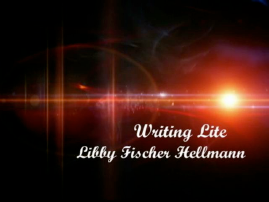 Click here to see the series The 12 rules (and corresponding video):
Click here to see the series The 12 rules (and corresponding video):
1. Suspense: it works only if you describe a threat and you don't resolve it for as long as you can, leaving your reader biting his nails;
2. Opening sentence: craft it so the reader wants to read the next sentence. Example from Ken Follett: "The small boys came early to the hanging." (from Pillars of the Earth );
3. Raise the stakes: create complications,dangers and challenges for your characters;
4. Closing sentence: it should be a "sting" or "cliffhanger"; you leave the action in media res, i.e. incomplete or unresolved, so your reader is moved to start on the next chapter to find out "what happens next";
5. Character backstories: in plotting your novel, write out in detail your characters' life stories; you'll use only 2 to 5 percent of this in your book, but you'll know your characters so well that you'll know exactly how they will behave/react when you put them through the challenges you've planned for them;
6. Authenticity: you need to make sure characters are behaving in a realistic, credible manner;
7. Characters' arcs: they are not fixed, they learn from what happens to them and this might change them a lot or only slightly - in a series, the main character needs to be recognizable from one book to the next;
8. Show, don't tell: this is obvious, but still fundamental: don't say "she is angry" but that "she went rigid"; an excellent example from Michael Connelly is quoted here;
9. Use the power of language: the artful choice of words makes the difference, a good plot alone does not carry the story; you need to focus on the emotional content of the words; to improve your language ability, read, read, read, including Reading like a Writer by Francine Prose;
10. Less is more: how to write lean prose, her tips: for the settings, 3 sentences are enough; back story should be minimal, sprinkle it here and there; use few adjectives (never more than two); strip out words like ever, just, always, sometimes...
11. The rythm of language: alternate length of sentences, make some short and crisp, others long and lyrical;
12. Casts: an acronym for building blocks (or target you need to hit) to structure your book's chapters; it was devised by award-winning mystery author Nancy Pickard; the system decripted:
c = conflict; it needs to be on every page and chapter;
a = action; not necessarily the primary action but something has to happen;
s = surprise; even a small surprise will do;
t = turn or change; not necessarly big but it has to happen;
s = sensory details, i.e. show, don't tell.
See the videos for more details.
Libby Hellmann promises to tell us more in future. But this is already quite a plateful! Anything else you want to add? What is most important for you?
For me, point 5 is the most important and that's why the challenges my characters face so often come from themselves rather than from outside (that's typical of so-called "psychological novels"); then add an external challenge, and, bingo, you've got a thriller!
There is obviously more to the art of crafting novels, in particular how to orchestrate the chapters and pull the threads of a story, making them all come to a head at the end for maximum drama and suspense...But let's hear what Libby has to say on that one!










 Click here to see the series The 12 rules (and corresponding video):
Click here to see the series The 12 rules (and corresponding video): 1. Suspense: it works only if you describe a threat and you don't resolve it for as long as you can, leaving your reader biting his nails;
2. Opening sentence: craft it so the reader wants to read the next sentence. Example from Ken Follett: "The small boys came early to the hanging." (from Pillars of the Earth );
3. Raise the stakes: create complications,dangers and challenges for your characters;
4. Closing sentence: it should be a "sting" or "cliffhanger"; you leave the action in media res, i.e. incomplete or unresolved, so your reader is moved to start on the next chapter to find out "what happens next";
5. Character backstories: in plotting your novel, write out in detail your characters' life stories; you'll use only 2 to 5 percent of this in your book, but you'll know your characters so well that you'll know exactly how they will behave/react when you put them through the challenges you've planned for them;
6. Authenticity: you need to make sure characters are behaving in a realistic, credible manner;
7. Characters' arcs: they are not fixed, they learn from what happens to them and this might change them a lot or only slightly - in a series, the main character needs to be recognizable from one book to the next;
8. Show, don't tell: this is obvious, but still fundamental: don't say "she is angry" but that "she went rigid"; an excellent example from Michael Connelly is quoted here;
9. Use the power of language: the artful choice of words makes the difference, a good plot alone does not carry the story; you need to focus on the emotional content of the words; to improve your language ability, read, read, read, including Reading like a Writer by Francine Prose;
10. Less is more: how to write lean prose, her tips: for the settings, 3 sentences are enough; back story should be minimal, sprinkle it here and there; use few adjectives (never more than two); strip out words like ever, just, always, sometimes...
11. The rythm of language: alternate length of sentences, make some short and crisp, others long and lyrical;
12. Casts: an acronym for building blocks (or target you need to hit) to structure your book's chapters; it was devised by award-winning mystery author Nancy Pickard; the system decripted:
c = conflict; it needs to be on every page and chapter;
a = action; not necessarily the primary action but something has to happen;
s = surprise; even a small surprise will do;
t = turn or change; not necessarly big but it has to happen;
s = sensory details, i.e. show, don't tell.
See the videos for more details.
Libby Hellmann promises to tell us more in future. But this is already quite a plateful! Anything else you want to add? What is most important for you?
For me, point 5 is the most important and that's why the challenges my characters face so often come from themselves rather than from outside (that's typical of so-called "psychological novels"); then add an external challenge, and, bingo, you've got a thriller!
There is obviously more to the art of crafting novels, in particular how to orchestrate the chapters and pull the threads of a story, making them all come to a head at the end for maximum drama and suspense...But let's hear what Libby has to say on that one!










Published on January 15, 2014 01:26
January 13, 2014
Unusual Monument to Nelson Mandela Plays with Light
This most unusual monument, an intricate play of metal and light, is in South Africa, in the Natal midlands.
This is what it looks like when you approach it, a suggestive bunch of metal rods:
 See anything? Here it is up close:
See anything? Here it is up close:
 Still nothing? There's a special spot from where you can see Mandela, so you need to move away:
Still nothing? There's a special spot from where you can see Mandela, so you need to move away:
 And when you stand on that sweet spot, here is what you see:
And when you stand on that sweet spot, here is what you see:

A beautiful tribute that draws light from the sky!
The artist, South African Marco Cianfanelli born in Johannesburg in 1970, did this in 2012 to mark the 50th anniversary since Mandela was captured by apartheid police in 1962; it is made of one steel rod per year, each rod measuring between 6.5 and 9.5 meters (21 and 30 feet). For more details, see here.
( source: my thanks to a friend of a friend who's drawn my attention to it)










This is what it looks like when you approach it, a suggestive bunch of metal rods:
 See anything? Here it is up close:
See anything? Here it is up close: Still nothing? There's a special spot from where you can see Mandela, so you need to move away:
Still nothing? There's a special spot from where you can see Mandela, so you need to move away: And when you stand on that sweet spot, here is what you see:
And when you stand on that sweet spot, here is what you see:
A beautiful tribute that draws light from the sky!
The artist, South African Marco Cianfanelli born in Johannesburg in 1970, did this in 2012 to mark the 50th anniversary since Mandela was captured by apartheid police in 1962; it is made of one steel rod per year, each rod measuring between 6.5 and 9.5 meters (21 and 30 feet). For more details, see here.
( source: my thanks to a friend of a friend who's drawn my attention to it)










Published on January 13, 2014 02:18
January 10, 2014
The European Commission is Killing E-Books!
 We all knew that the European Commission is a stupid bureaucracy that often weighs down on economic growth, as shown by its thoughtless embrace of German-promoted austerity policies. The Commission only recently woke up to the fact that Germany is the greatest beneficiary of austerity policies at the expense of Euro-zone members, especially Southern Europe. And now, it has just engaged in a bit of plant legistlation that will probably favor the big corporations and multinationals (see articles below). Why? You may well ask. The EU Commission's micro-management is wrecking not only the economy but also culture and the quality of life of the average European citizen.
We all knew that the European Commission is a stupid bureaucracy that often weighs down on economic growth, as shown by its thoughtless embrace of German-promoted austerity policies. The Commission only recently woke up to the fact that Germany is the greatest beneficiary of austerity policies at the expense of Euro-zone members, especially Southern Europe. And now, it has just engaged in a bit of plant legistlation that will probably favor the big corporations and multinationals (see articles below). Why? You may well ask. The EU Commission's micro-management is wrecking not only the economy but also culture and the quality of life of the average European citizen. And it continues to batter digital publishing with ridiculous taxes: it requires the full VAT rate (sales tax) on e-books while allowing a reduced rate (around 5.5%) on printed books.
The reduced rate makes sense: it is based on the concept that books are a social benefit and they deserve support. But since the European VAT laws were drawn up before the digital age, e-books are not included. They're categorzed as an electronic service, and hence cannot get a tax exemption. Many EU member countries protest (see article below about Estonia) but so far few countries have broken rank - only France and Luxembourg - and treat e-books the same as printed books. But Brussels doesn't like it. Not one bit. See here.
As long as ebooks are taxed to death compared to printed books, the digital revolution won't be coming to Europe. When will the guys in Brussels wake up?
(source of photo: authormedia - manipulation is my own)
Related articles
 There is only one way to end Europe's economic woes. Germany needs to buy more stuff.(washingtonpost.com)
There is only one way to end Europe's economic woes. Germany needs to buy more stuff.(washingtonpost.com)
 European Commission To Ban Heirloom Seeds - Criminalize Plants Not Registered With Government(prn.fm)
European Commission To Ban Heirloom Seeds - Criminalize Plants Not Registered With Government(prn.fm)
 Vice-president of European Commission rallies for 'United States of Europe'(express.co.uk)
Vice-president of European Commission rallies for 'United States of Europe'(express.co.uk)
 European commission braces for bitter battle over new chief(theguardian.com)
European commission braces for bitter battle over new chief(theguardian.com)
 Ministry Supports VAT Cut for E-Books, EU Rules Stand in the Way(news.err.ee)
Ministry Supports VAT Cut for E-Books, EU Rules Stand in the Way(news.err.ee)










Published on January 10, 2014 23:46
January 6, 2014
The 2013 Slowdown in E-books Sales: Good News for the Publishing Industry
 The slowdown in e-books sales, barely perceptible in 2012, has now become a certainty. Estimates for 2013 show a flattening out of the rate of growth that used to be exponential just a few years ago.
The slowdown in e-books sales, barely perceptible in 2012, has now become a certainty. Estimates for 2013 show a flattening out of the rate of growth that used to be exponential just a few years ago. Has the market for e-books reached maturity?
For the DBW Daily, the slowdown is temporary. Kids will make the difference as they grow up to be e-reading adults (read full article here) and this Christmas, lots of parents plan on buying ebooks and reading devices for their children:
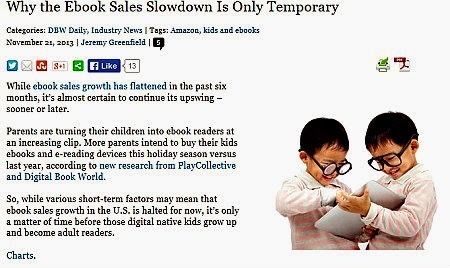
In other words, it's just a glitch and growth will pick up again.
But other factors need to be taken into account, as noted by Publisher Weekly (see here), in particular:
1. There has been no blockbuster in 2013 like there had been in previous years (think of 50 Shades of Grey or the Hunger Game or Twilight trilogies);
2. Growth in the sales of digital devices is slowing down; while the tablet market has exploded, devices dedicated to reading have not. That could mean that fewer books are read per device, tablet owners are known to read fewer books - they picked a tablet precisely because they prefer their entertainment in the form of videos rather than books.
But what if ebooks had actually reached a balance vs. printed books?
That more radical explanation is the one espoused by most pundits in the industry. Even so, as reported by the New York Times, (see here), booksellers are "wary" about holiday sales. The news that ebook sales have slowed are not particularly thrilling if in fact, it's the whole market, both printed and digital that has flattened out.
No matter how the Christmas sales go, it would seem that ebooks have now become just another format, like paperbacks or audiobooks.
The sheen of novelty is gone. The publishing industry is entering into a more mature, balanced phase.
In short: good news!
If all this is true, then the game for self-published authors is going to be very different in the coming years. In a stabilized market, I would expect:
1. increased price wars; in fact, that's already happening with the price of traditionally published best-sellers being dropped these days, in time for the Christmas sales;
2. increased competition on book quality, in terms of both looks (editing, book cover design) and content (writing style or "voice", originality of plot, character development etc). Typos, poor formatting and unprofessional looking book covers will no longer be acceptable to readers who have grown savvier and more demanding.
For self-published authors, this means that they may have less space to grow. There will be a need to change strategy, to improve the quality of books on offer rather than merely increase the number of titles.
What is your strategy in this slowing market for digital books? I have taken a hard look at the books I've published so far and pulled down one early title ("Fear of the Past") and, after a thorough job of re-editing and adding new material, I've re-released it with a new cover and a new title: "Luna Rising". I'm satisfied that it is now a much better book. Likewise, I'm going through my other title, "A Hook in the Sky" and I plan to shortly re-release it (I've already changed the cover). More on that soon.
How about you?
Source of image: Sales sign at http://www.mysecuritysign.com/PS/Store-Policy-Signs.aspx. Related articles from Zemanta:
 Without a Blockbuster Title for the Holidays, Indie Authors Can Step Up to the Plate(goodereader.com)
Without a Blockbuster Title for the Holidays, Indie Authors Can Step Up to the Plate(goodereader.com)
 Reading the wrong runes in the ebook sales slowdown?(teleread.com)
Reading the wrong runes in the ebook sales slowdown?(teleread.com)
 In 2013, eBook Sales Collapsed... in My Household.(go-to-hellman.blogspot.com)
In 2013, eBook Sales Collapsed... in My Household.(go-to-hellman.blogspot.com)
 Go Read This | Smashwords: 2014 Book Publishing Industry Predictions - Price Drops to Impact Competitive Dynamics(eoinpurcellsblog.com)
Go Read This | Smashwords: 2014 Book Publishing Industry Predictions - Price Drops to Impact Competitive Dynamics(eoinpurcellsblog.com) 









Published on January 06, 2014 05:29
January 2, 2014
The 2013 Slowdown in E-books Sales: Good News for the Publishing Industry?
 The slowdown in e-books sales, barely perceptible in 2012, has now become a certainty. Estimates for 2013 show a flattening out of the rate of growth that used to be exponential just a few years ago.
The slowdown in e-books sales, barely perceptible in 2012, has now become a certainty. Estimates for 2013 show a flattening out of the rate of growth that used to be exponential just a few years ago. Has the market for e-books reached maturity?
For the DBW Daily, the slowdown is temporary. Kids will make the difference as they grow up to be e-reading adults (read full article here) and this Christmas, lots of parents plan on buying ebooks and reading devices for their children:

In other words, it's just a glitch and growth will pick up again.
But other factors need to be taken into account, as noted by Publisher Weekly (see here), in particular:
1. There has been no blockbuster in 2013 like there had been in previous years (think of 50 Shades of Grey or the Hunger Game or Twilight trilogies);
2. Growth in the sales of digital devices is slowing down; while the tablet market has exploded, devices dedicated to reading have not. That could mean that fewer books are read per device, tablet owners are known to read fewer books - they picked a tablet precisely because they prefer their entertainment in the form of videos rather than books.
But what if ebooks had actually reached a balance vs. printed books?
That more radical explanation is the one espoused by most pundits in the industry. Even so, as reported by the New York Times, (see here), booksellers are "wary" about holiday sales. The news that ebook sales have slowed are not particularly thrilling if in fact, it's the whole market, both printed and digital that has flattened out.
No matter how the Christmas sales go, it would seem that ebooks have now become just another format, like paperbacks or audiobooks.
The sheen of novelty is gone. The publishing industry is entering into a more mature, balanced phase.
In short: good news!
If all this is true, then the game for self-published authors is going to be very different in the coming years. In a stabilized market, I would expect:
1. increased price wars; in fact, that's already happening with the price of traditionally published best-sellers being dropped these days, in time for the Christmas sales;
2. increased competition on book quality, in terms of both looks (editing, book cover design) and content (writing style or "voice", originality of plot, character development etc). Typos, poor formatting and unprofessional looking book covers will no longer be acceptable to readers who have grown savvier and more demanding.
In short, self-published authors will have less space to grow in a "mature" market, and Heaven forbid, that the market should become stagnant!
What is your strategy in this slowing market for digital books?
Source of image: Sales sign at http://www.mysecuritysign.com/PS/Store-Policy-Signs.aspx. Related articles
 Without a Blockbuster Title for the Holidays, Indie Authors Can Step Up to the Plate(goodereader.com)
Without a Blockbuster Title for the Holidays, Indie Authors Can Step Up to the Plate(goodereader.com)
 Reading the wrong runes in the ebook sales slowdown?(teleread.com)
Reading the wrong runes in the ebook sales slowdown?(teleread.com) 









Published on January 02, 2014 23:52
Why is the Goal of a United Europe Dead?
Seen from abroad, one may well wonder why the Euro crisis is taking so long to resolve, why the construction of Europe has come to a stop. One quick answer: the revival of nationalism across Europe triggered by the recession. But it's a little more complicated than that.
Take the case of Italy, historically one of the six founding members of what eventually became the EU, and up to now, always a staunch supporter of the ideal of a United Europe.
No more.
Consider the blog of an Italian conservative politician, Antonio Martino, who is generally viewed as the Italian Margaret Thatcher. Of course, he does everything to make people believe in that myth. Look at the home page of his blog (my screen shot) and you'll see what I mean:
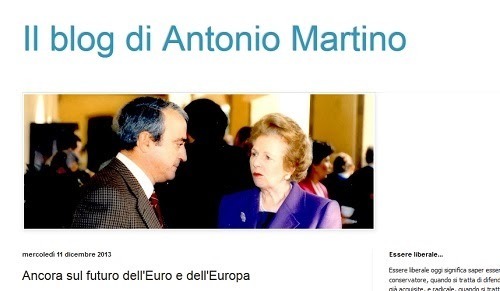
He blogs rarely and in spite of that, he gets a fair number of comments on his posts - presumably a good index of his political weight on the Italian political scene. For example, a recent one (dated 11 December 2013) on the future of the Euro and Europe got 175 comments, not bad! Commentators were, most of them, in agreement with him that Europe and the Euro is headed for a well-deserved disaster; in short, the Euro does not help in the construction of Europe.
He is of the view that in any case, it is useless to try and unite Europe, there's not a single EU member (except perhaps for Luxemburg) that is willing to give up its sovereignty on what he sees as the two major roles of the State: defense and foreign affairs.
Judging from what is happening in Europe and how the Euro crisis is evolving, it seems to me obvious that those two areas are not - by far! - the real obstacles to the construction of a United Europe. Sorry, Mr. Martino, but you're dead wrong on that one!
The real obstacle is tied to the question of the State budget: no politician dares give up his/her nation's sovereignty on the budget!
That is what the real problem is. Because the state budget is where the butter that oils the wheels of political life is coming from...
Now tell me what politician is willing to give up control over the cash flowing out of the State coffers? With the introduction of the Euro, it was bad enough. Politicians suddenly found that they had to give up control over the printing press!
They are so ignorant, these politicians of ours, that they hadn't quite realized what they had done. I remember meeting Mr. Antonio Martino in Rome back in the early 2000s (at the time he was Defense Minister in Berlusconi's government) and he was strutting about, proud of the Euro...And now he hates it?? Mr. Martino has a short memory - or rather, he now realizes how much the political class lost with the adoption of the Euro.
And that is why the resolution of the Euro crisis is taking so long. No politician worth his salt wants to see the situation resolved anytime soon. So they're playing with fire, hoping that threats from extremists (like the Grillo partisans who hate the Euro) will allow them to push into the future the adoption of the needed measures to shore up the Euro, in particular the fiscal union that sooner or later cannot be avoided...
There's clearly no idealism left in European politicians, the times of Jean Monnet and Helmut Schmidt are gone.
What we have are a bunch of little men all desperately trying to find which side of the bread slice is buttered. The only one who stands strong as a European defending Europe is not a politician at all but a central banker: Mario Draghi who has made it absolutely clear that he will use "all that it takes" to defend the Euro (see Krugman's illuminating article below).
Oh, when will politicians stop politicking?
 The State of the Euro, In One Graph(krugman.blogs.nytimes.com)
The State of the Euro, In One Graph(krugman.blogs.nytimes.com)










Take the case of Italy, historically one of the six founding members of what eventually became the EU, and up to now, always a staunch supporter of the ideal of a United Europe.
No more.
Consider the blog of an Italian conservative politician, Antonio Martino, who is generally viewed as the Italian Margaret Thatcher. Of course, he does everything to make people believe in that myth. Look at the home page of his blog (my screen shot) and you'll see what I mean:

He blogs rarely and in spite of that, he gets a fair number of comments on his posts - presumably a good index of his political weight on the Italian political scene. For example, a recent one (dated 11 December 2013) on the future of the Euro and Europe got 175 comments, not bad! Commentators were, most of them, in agreement with him that Europe and the Euro is headed for a well-deserved disaster; in short, the Euro does not help in the construction of Europe.
He is of the view that in any case, it is useless to try and unite Europe, there's not a single EU member (except perhaps for Luxemburg) that is willing to give up its sovereignty on what he sees as the two major roles of the State: defense and foreign affairs.
Judging from what is happening in Europe and how the Euro crisis is evolving, it seems to me obvious that those two areas are not - by far! - the real obstacles to the construction of a United Europe. Sorry, Mr. Martino, but you're dead wrong on that one!
The real obstacle is tied to the question of the State budget: no politician dares give up his/her nation's sovereignty on the budget!
That is what the real problem is. Because the state budget is where the butter that oils the wheels of political life is coming from...
Now tell me what politician is willing to give up control over the cash flowing out of the State coffers? With the introduction of the Euro, it was bad enough. Politicians suddenly found that they had to give up control over the printing press!
They are so ignorant, these politicians of ours, that they hadn't quite realized what they had done. I remember meeting Mr. Antonio Martino in Rome back in the early 2000s (at the time he was Defense Minister in Berlusconi's government) and he was strutting about, proud of the Euro...And now he hates it?? Mr. Martino has a short memory - or rather, he now realizes how much the political class lost with the adoption of the Euro.
And that is why the resolution of the Euro crisis is taking so long. No politician worth his salt wants to see the situation resolved anytime soon. So they're playing with fire, hoping that threats from extremists (like the Grillo partisans who hate the Euro) will allow them to push into the future the adoption of the needed measures to shore up the Euro, in particular the fiscal union that sooner or later cannot be avoided...
There's clearly no idealism left in European politicians, the times of Jean Monnet and Helmut Schmidt are gone.
What we have are a bunch of little men all desperately trying to find which side of the bread slice is buttered. The only one who stands strong as a European defending Europe is not a politician at all but a central banker: Mario Draghi who has made it absolutely clear that he will use "all that it takes" to defend the Euro (see Krugman's illuminating article below).
Oh, when will politicians stop politicking?
 The State of the Euro, In One Graph(krugman.blogs.nytimes.com)
The State of the Euro, In One Graph(krugman.blogs.nytimes.com)










Published on January 02, 2014 00:18
December 29, 2013
You Have a Dream? Find Your Way, Make it a Happy 2014!
2013 is soon over, much happened this year, much that was wonderful and much that was awful, but what I want to remember from 2013 is this fantastic lesson coming to us from the brave Diana Nyad, who did something this summer that nobody thought was possible.
 Diana Nyad, then and now
Diana Nyad, then and now
She swam non-stop for 53 hours from Cuba to Florida, thus achieving at the age of 64 the dream she'd had since she was twenty. Amazing! And remember, this is a dream that champion swimmers have had for the past 75 years without anyone ever achieving it.
Here's her TED talk about it (done in December), enjoy it!
She's right: Never, ever give up! This applies not only to sports, but to everything in life.
Happy 2014!










 Diana Nyad, then and now
Diana Nyad, then and nowShe swam non-stop for 53 hours from Cuba to Florida, thus achieving at the age of 64 the dream she'd had since she was twenty. Amazing! And remember, this is a dream that champion swimmers have had for the past 75 years without anyone ever achieving it.
Here's her TED talk about it (done in December), enjoy it!
She's right: Never, ever give up! This applies not only to sports, but to everything in life.
Happy 2014!










Published on December 29, 2013 01:55
December 27, 2013
The Secret to Writing a Good Story: Lessons Learned from "Great Expectations"
Last night, I watched on TV the latest adapatation of Dickens' masterpiece, Mike Newell's 2012 film of Great Expectations, and I was reminded of the basic ingredients for a writing a good story - nay, in this case a great story! If you haven't seen it, here's the international trailer:
The film, while very good - the actors are excellent, the settings atmospheric - was a relative success (see Rotten Tomatoes'rating here and The Guardian's review here), I suspect because the producers assumed too much knowledge of Dickens' book on the part of the audience. As a result, there were cluttered, hard-to-understand passages, with the resulting risk of losing the audience.
But back to Dickens and his great coming-of-age story of a humble orphan who's drawn upward in society by an anonymous benefactor and discovers that becoming a gentleman is not a key to happiness. Why is it such a good story? Simple:
It addresses universal human preoccupations: love, social mobility, happiness; It has many unexpected twists and turns that keep you wondering "what's next"; and for us who inhabit the 21st century, it has an exotic setting: Victorian England.Reality check: how does your book compare?
I just checked my current work, a book I first published many years ago (in 2007 and in Italian) and that I spent months revising, cutting over 100,000 words and adding a new 20,000 words - to the extent that now it is something totally different and new. I am speaking of Luna Rising that was released just now, at Christmas, the full saga as well as each volume separately:
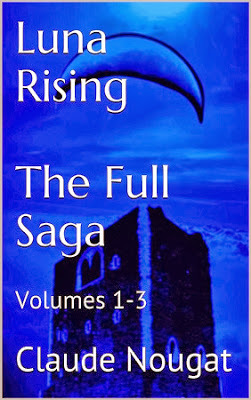 Available on Amazon, click here for a 40% discount Luna Rising is a coming-of-age story told from the standpoint of a teenager who is born a "gifted child", made lonely by his extraordinary mental abilities. Check, point 1 (universal human preoccupation - the anguish of self-discovery).
Available on Amazon, click here for a 40% discount Luna Rising is a coming-of-age story told from the standpoint of a teenager who is born a "gifted child", made lonely by his extraordinary mental abilities. Check, point 1 (universal human preoccupation - the anguish of self-discovery).
It is also a family saga set in Sicily (check, point 3, an exotic setting) where Tony Luna goes searching for his family roots and encounters the ghosts of his ancestors in a place out of time, the Circle of Conversation. Among them, a beautiful woman is attracted to him...Check, point 2 (the twists and turns).
And good news, in a Holiday spirit, I am offering you, my dear reader, volume 1 of Luna Rising, called The Circle of Conversation, FREE on Smashwords: click here to get your free copy but if you prefer Amazon, you can get it for only 99 cents here .
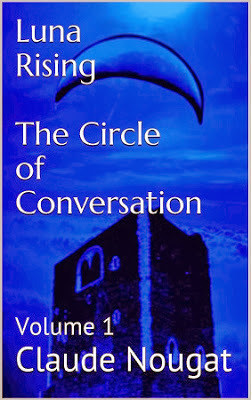 FREE on Smashwords, 99 cents on AmazonPlease note that if you get Luna Rising, the Full Saga (volumes 1-3), you'll save over 40% on the whole series. Click
here
to get it.
FREE on Smashwords, 99 cents on AmazonPlease note that if you get Luna Rising, the Full Saga (volumes 1-3), you'll save over 40% on the whole series. Click
here
to get it.
I know, this looks like a shameful book promotion, but it's not. I'm not spamming you, I wanted to find out what you, my readers here, really think of my book, whether I manage to fulfill "expectations", the three points mentioned above. That's why I've made the first book free and I give away the whole series at a deep discount. Let me know what you think!
Happy reading and happy Holidays!
PS: Just to set the record straight, I don't pretend to be like Charles Dickens (chuckle)...Just that we can still learn from him, that's all!










The film, while very good - the actors are excellent, the settings atmospheric - was a relative success (see Rotten Tomatoes'rating here and The Guardian's review here), I suspect because the producers assumed too much knowledge of Dickens' book on the part of the audience. As a result, there were cluttered, hard-to-understand passages, with the resulting risk of losing the audience.
But back to Dickens and his great coming-of-age story of a humble orphan who's drawn upward in society by an anonymous benefactor and discovers that becoming a gentleman is not a key to happiness. Why is it such a good story? Simple:
It addresses universal human preoccupations: love, social mobility, happiness; It has many unexpected twists and turns that keep you wondering "what's next"; and for us who inhabit the 21st century, it has an exotic setting: Victorian England.Reality check: how does your book compare?
I just checked my current work, a book I first published many years ago (in 2007 and in Italian) and that I spent months revising, cutting over 100,000 words and adding a new 20,000 words - to the extent that now it is something totally different and new. I am speaking of Luna Rising that was released just now, at Christmas, the full saga as well as each volume separately:
 Available on Amazon, click here for a 40% discount Luna Rising is a coming-of-age story told from the standpoint of a teenager who is born a "gifted child", made lonely by his extraordinary mental abilities. Check, point 1 (universal human preoccupation - the anguish of self-discovery).
Available on Amazon, click here for a 40% discount Luna Rising is a coming-of-age story told from the standpoint of a teenager who is born a "gifted child", made lonely by his extraordinary mental abilities. Check, point 1 (universal human preoccupation - the anguish of self-discovery). It is also a family saga set in Sicily (check, point 3, an exotic setting) where Tony Luna goes searching for his family roots and encounters the ghosts of his ancestors in a place out of time, the Circle of Conversation. Among them, a beautiful woman is attracted to him...Check, point 2 (the twists and turns).
And good news, in a Holiday spirit, I am offering you, my dear reader, volume 1 of Luna Rising, called The Circle of Conversation, FREE on Smashwords: click here to get your free copy but if you prefer Amazon, you can get it for only 99 cents here .
 FREE on Smashwords, 99 cents on AmazonPlease note that if you get Luna Rising, the Full Saga (volumes 1-3), you'll save over 40% on the whole series. Click
here
to get it.
FREE on Smashwords, 99 cents on AmazonPlease note that if you get Luna Rising, the Full Saga (volumes 1-3), you'll save over 40% on the whole series. Click
here
to get it.I know, this looks like a shameful book promotion, but it's not. I'm not spamming you, I wanted to find out what you, my readers here, really think of my book, whether I manage to fulfill "expectations", the three points mentioned above. That's why I've made the first book free and I give away the whole series at a deep discount. Let me know what you think!
Happy reading and happy Holidays!
PS: Just to set the record straight, I don't pretend to be like Charles Dickens (chuckle)...Just that we can still learn from him, that's all!










Published on December 27, 2013 06:47
December 23, 2013
Christmas Lights...My Gift to You, Beloved Reader!
I just wrote a Christmas tale based on a real episode in my life - very short, a 3 minute read! It was published on ReadWave and immediately started "trending". Here's a screen shot of the title page:
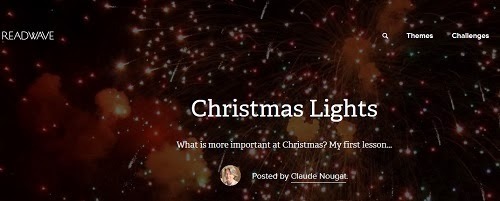
And here's the beginning of the story:
"I banged on the door like mad. My parents were in there, in the big room where we never went, the room reserved for guests, and I wanted to be with them. Why didn’t they let me in? Brita tried to stop me but I wouldn’t listen to her. I banged harder.
Dad stuck his head out, he was frowning. “Will you stop that?” he yelled. “Now wait, like a good little girl.” And he slammed the door shut.
Brita took my hand and pulled me back. I could feel the tears welling up. She kneeled down and smiled. I loved her kind blue eyes and the brown curls of her hair that let her ears stick out. She was the first person I saw in the morning and the last at night. She gave me my breakfast porridge and tucked me in bed...."
To find out what's behind that closed door, read the rest here
And to check how it's "trending", you can find it here. Please "like" it, if you do!
If you don't know about ReadWave, you can find out about it here and visit their homepage here. It's a fun site doing a very good job of connecting authors and readers.
Merry Christmas and Happy Holidays!











And here's the beginning of the story:
"I banged on the door like mad. My parents were in there, in the big room where we never went, the room reserved for guests, and I wanted to be with them. Why didn’t they let me in? Brita tried to stop me but I wouldn’t listen to her. I banged harder.
Dad stuck his head out, he was frowning. “Will you stop that?” he yelled. “Now wait, like a good little girl.” And he slammed the door shut.
Brita took my hand and pulled me back. I could feel the tears welling up. She kneeled down and smiled. I loved her kind blue eyes and the brown curls of her hair that let her ears stick out. She was the first person I saw in the morning and the last at night. She gave me my breakfast porridge and tucked me in bed...."
To find out what's behind that closed door, read the rest here
And to check how it's "trending", you can find it here. Please "like" it, if you do!
If you don't know about ReadWave, you can find out about it here and visit their homepage here. It's a fun site doing a very good job of connecting authors and readers.
Merry Christmas and Happy Holidays!










Published on December 23, 2013 09:47



